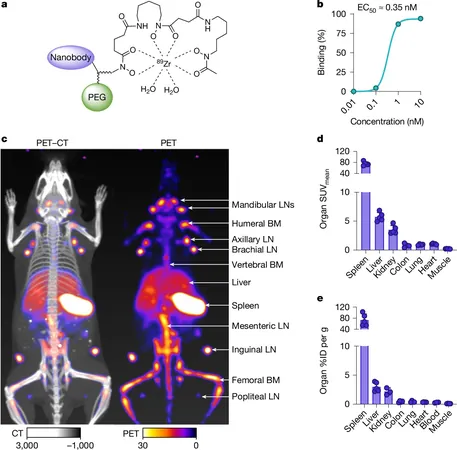
Revolutionary PET Imaging Technique Unveils Inflammation Like Never Before!
2025-01-22
Author: Rajesh
Researchers at the Dana-Farber Cancer Institute have made a significant leap in medical technology by developing a groundbreaking method to detect inflammation in the body using positron emission tomography (PET) imaging. This cutting-edge technique utilizes a specialized probe targeting CD45, a marker found abundantly on immune cells, which allows for an unprecedented level of detail in imaging.
The findings were recently published in the prestigious journal *Nature*, marking a milestone in the quest for non-invasive imaging tools.
Inflammation is a crucial physiological response that indicates the immune system is actively fighting potential threats within the body. However, chronic or excessive inflammation can lead to severe health problems, contributing to an array of chronic diseases such as cardiovascular issues, cancer, and diabetes—conditions that account for a substantial share of global mortality rates. Until now, reliable, non-invasive tools to accurately identify and localize inflamed areas within the body have been sorely lacking.
In studies involving healthy animals, the new probe delivered strikingly clear images of vital immune organs, including the bone marrow, spleen, and lymph nodes. In various disease models, the probe was able to uncover inflammation in critical areas, such as the colon in cases of inflammatory bowel disease and in the lungs of patients with acute respiratory distress syndrome.
Remarkably, the severity of inflammation observed through the CD45-PET probe directly correlated with both microscopic tissue analysis and clinical symptoms, offering a promising diagnostic capability. The researchers have also successfully developed a human version of the CD45-PET probe, demonstrating its potential to detect human immune cells in mouse models engineered to replicate human immune responses.
Furthermore, during investigations into graft-versus-host disease—a serious complication that can arise after bone marrow transplants—the human CD45-PET probe proved effective in early detection and precise localization of the condition, which can affect multiple body regions. The research team is now gearing up to start clinical trials that will validate the efficacy of their human CD45-PET probe in real-world scenarios.
This innovative CD45-PET probe stands out as the first technology capable of identifying inflammation broadly and with remarkable sensitivity throughout the entire body. Once human trials confirm its effectiveness, this tool could transform clinical practices by assisting healthcare providers in selecting targeted anti-inflammatory treatments, monitoring patient responses to medications and cancer immunotherapies, and improving the diagnosis of various inflammation-related conditions.
As healthcare advances, the potential for this new imaging method could not only lead to better patient outcomes but also herald a new era in the understanding and treatment of chronic diseases driven by inflammation. Stay tuned for more updates on this impressive breakthrough that may reshape how we address health issues at their very core!




 Brasil (PT)
Brasil (PT)
 Canada (EN)
Canada (EN)
 Chile (ES)
Chile (ES)
 Česko (CS)
Česko (CS)
 대한민국 (KO)
대한민국 (KO)
 España (ES)
España (ES)
 France (FR)
France (FR)
 Hong Kong (EN)
Hong Kong (EN)
 Italia (IT)
Italia (IT)
 日本 (JA)
日本 (JA)
 Magyarország (HU)
Magyarország (HU)
 Norge (NO)
Norge (NO)
 Polska (PL)
Polska (PL)
 Schweiz (DE)
Schweiz (DE)
 Singapore (EN)
Singapore (EN)
 Sverige (SV)
Sverige (SV)
 Suomi (FI)
Suomi (FI)
 Türkiye (TR)
Türkiye (TR)
 الإمارات العربية المتحدة (AR)
الإمارات العربية المتحدة (AR)